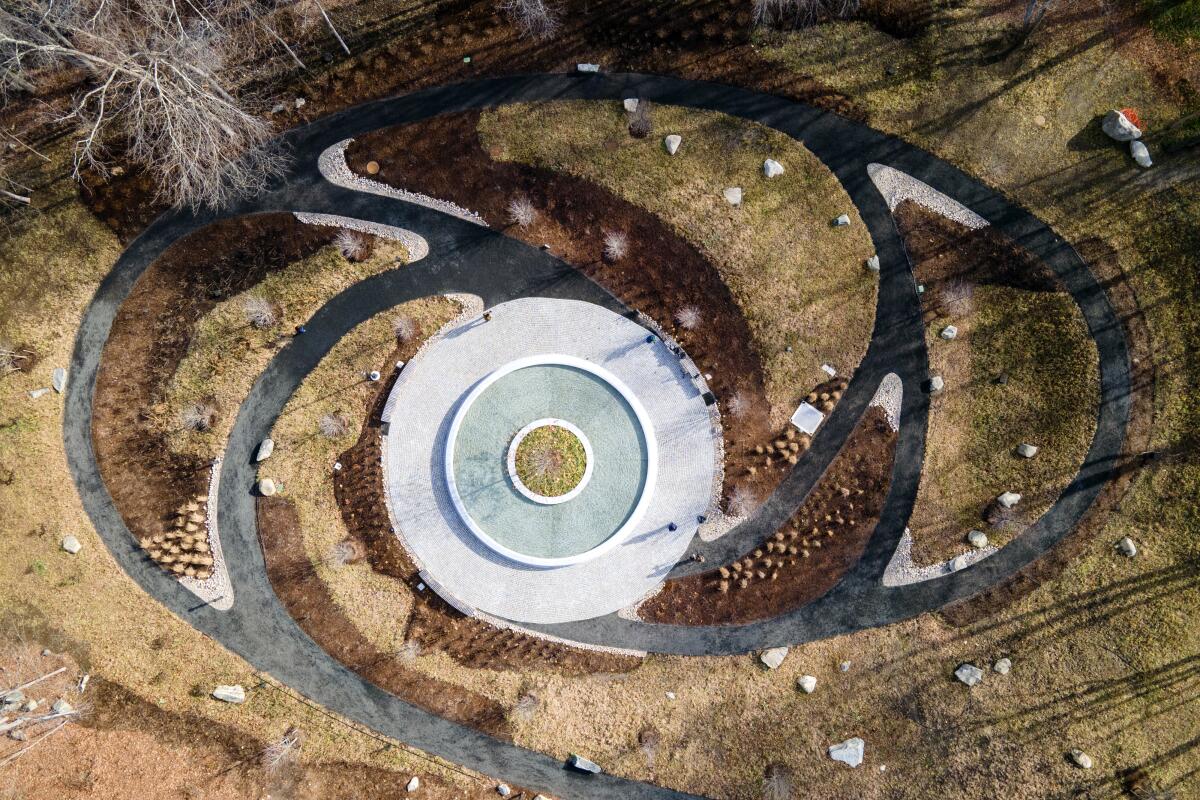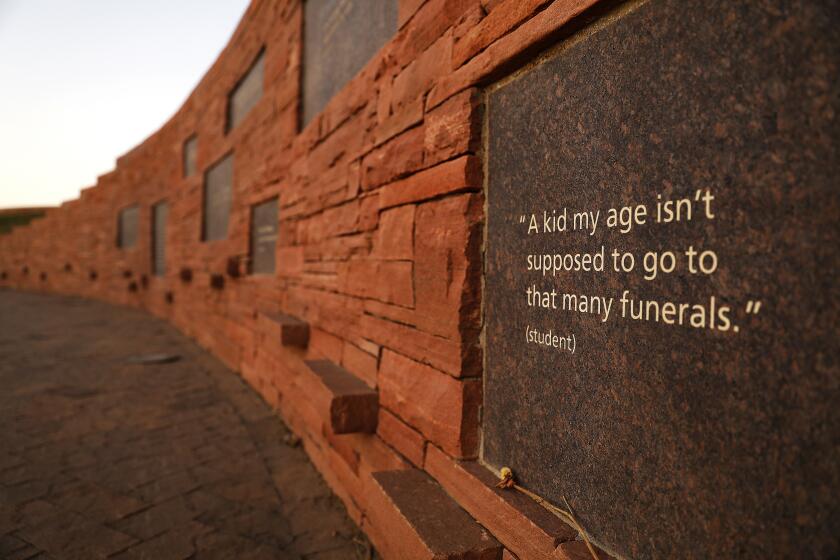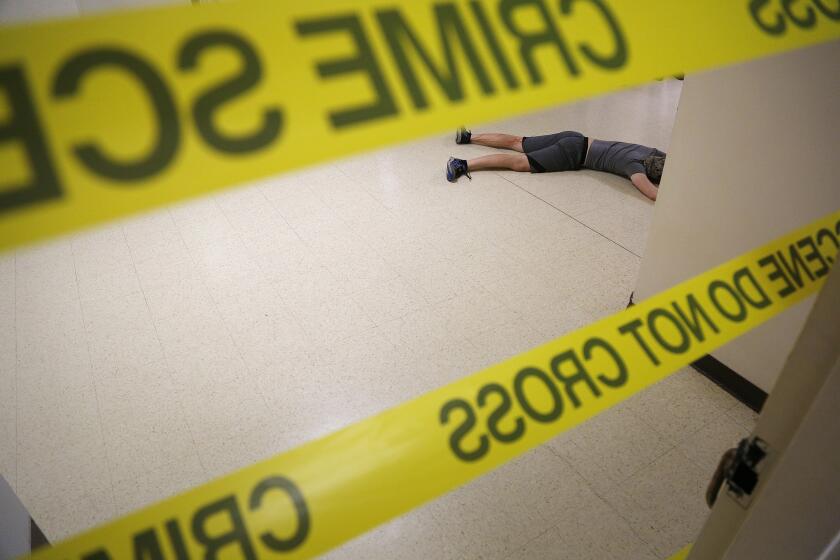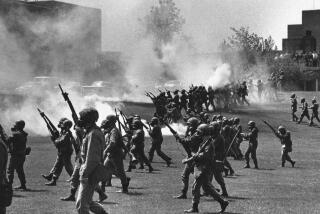Op-Ed: My friends’ daughter was killed at Sandy Hook. Ten years later, we owe it to survivors to press beyond cynicism

- Share via
Ten years ago the unthinkable happened.
On Dec. 14, 2012, 20 children and six adults were murdered at Sandy Hook Elementary School in Newtown, Conn. One of those children was Avielle Richman, whose father, Jeremy, had become friends with my family when he worked with my wife, Nuvia, in San Diego.
We celebrated birthday parties and barbecues at the home he shared with his wife, Jennifer Hensel. Our daughters went trick-or-treating together. We remained close after Jeremy and his family relocated to Newtown.
I heard about the shooting at Sandy Hook while I was at work. I texted my wife what little I knew. What I didn’t know at that moment was that our friends in Newtown were living a parent’s worst nightmare. Their little girl was gone.
“Just get out here,” Jennifer texted Nuvia.
I left my office to get Nuvia and fly to Connecticut. As I waited for the elevator I remember thinking, “This is it. This is the moment that will divide my life into before and after.” Not just my life, I was naive enough to think, but the history of the entire nation.
Our country has mass shootings almost daily. I wish I could tell you after your incident that it will all be OK soon. But that would be a lie.
While we were in Newtown for Avielle’s memorial service, we watched the community and the country, from local restaurants to global corporations, do what they could to help alleviate the catastrophic suffering that descended on Newtown. Celebrities reached out to offer their condolences, and strangers appeared to handle the tasks that emerge when your small town becomes a talking point on the national news. What do you do when the funeral homes run out of coffins and incoming mail threatens to overwhelm the local post office?
As dark as things seemed, the collective response gave me hope that the compassion of everyday Americans would prevail over groups like the National Rifle Assn. of America that had hijacked conservative politicians in the U.S. Senate and the House of Representatives.
Like many people, I believed the shootings would serve as a catalyst for the federal government to be able to enact stronger gun control measures and ensure that the horrors of Sandy Hook would never be repeated. I needed to believe that in the foreseeable future we could send our children to school and feel confident about their safety.
It fills me with frustration, rage and sorrow that those things did not come to pass.
Although some gun control measures have been introduced, it’s not nearly enough. It’s largely up to the states to determine who gets to own a firearm and where they can carry it, creating a byzantine patchwork of laws with plenty of loopholes.
The result? There have been so many mass shootings between Sandy Hook and now, we can’t possibly remember them all. For every Las Vegas, Orlando and Parkland, there’s an El Paso, San Bernardino and Sutherland Springs.
There are towns nationwide that are associated with mass shootings. It feels as if the nation has become blasé about these crimes, so much so that law enforcement officers in Uvalde, Texas, couldn’t be bothered to do their jobs while a murderer killed 19 young children and two adults inside Robb Elementary School in May. The outcry after these events has, like so many things, become predictably political.
During a school lockdown, you see the fear in your students’ eyes and you feel the fear in your own eyes even as you try to remain calm.
At least Alex Jones, who lied by calling the shootings at Sandy Hook a “false flag” operation, has been sued into the Stone Age. He now owes the litigants close to $1.5 billion, but for them and the nation, it’s too little, too late. The damage of endless devastating losses, and a politicized response to mass shootings, has been done. And what do we have to show for it?
Traumatizing active-shooter drills, entire communities destroyed and defenders of the 2nd Amendment who believe they’re victims of a government that wants to take their rights away.
We live in much more cynical times now.
After the murders in Newtown, psychologists told the community to get ready: alcoholism, divorce and suicide were coming. Those grim words proved to be true. Avielle’s father, Jeremy — our dear friend and a scientist who tirelessly advocated for better education about brain health — took his own life in 2019.
I don’t know what it’s going to take to make our nation’s lawmakers wake up and make mass shootings a thing of the past. I do know that losing a child, a family member or a neighbor to gun violence is devastating. Carrying that trauma for a lifetime comes with social, emotional and financial costs that never go away.
Some of the parents who lost a child at Sandy Hook have since had children who are now older than the siblings they will never know. If Avielle and her classmates were still alive, they’d be spending the holidays with their families, waiting to hear which colleges they’d been accepted to for the fall of 2023.
Instead there’s a hole in the fabric of our nation that grows and grows and grows. Each week there’s another family, another school, another community ripped apart by gun violence. We owe it to these survivors to resist the cynicism of the status quo.
We once thought Sandy Hook would be the last straw. So many mass shootings have happened in the 10 years since. How many more will it take before we put a stop to this madness?
Jim Ruland is a writer living in San Diego.
More to Read
A cure for the common opinion
Get thought-provoking perspectives with our weekly newsletter.
You may occasionally receive promotional content from the Los Angeles Times.









